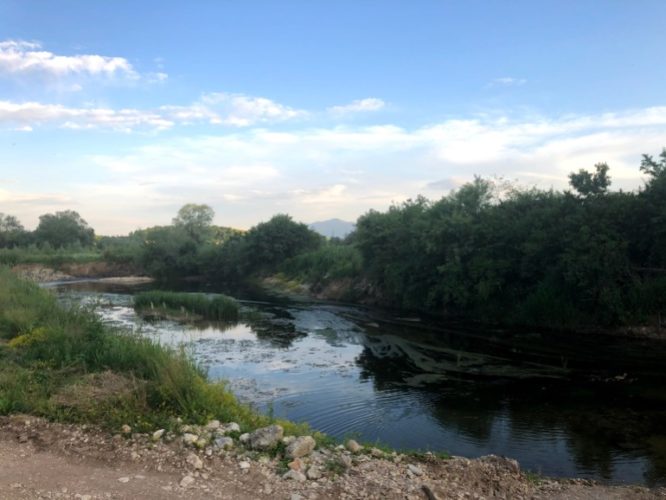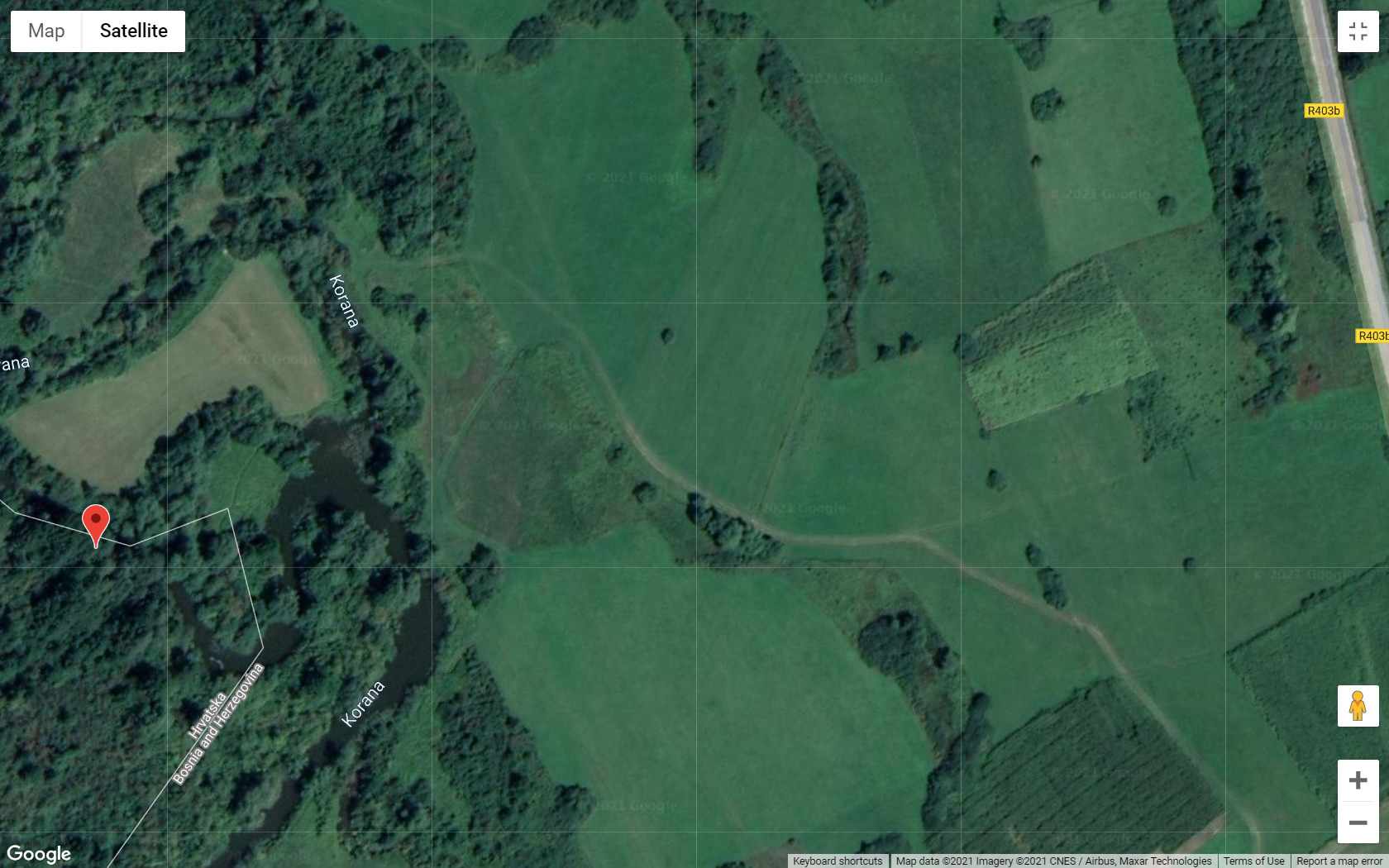We said ‘Give us stay!’ [...] They only said ‘Quiet, silence!’ ... always, ‘Silence, silence!'
| 28.10.2021 | 45.023368, 15.764446, around 6km southwest of the Bosnian town of Šturlić | No Name Kitchen | 45.023368, 15.764446 | Croatia | Bosnia | no | no | yes | yes | no | no | 17 - 32 | 20 | Afghanistan, Pakistan | 14 | beating (with batons/hands/other), exposure to air condition and extreme temperature during car ride, water immersion, threatening with guns, destruction of personal belongings, theft of personal belongings | 4 male Croatian officers in black uniforms and at least one police car; 4 male and two female Croatian officers in blue uniforms and 1 white van and 2 normal-size police cars, saying 'Policija' in blue; at least four to five additional Croatian officers in dark blue uniforms and at least one additional police car |
On Thursday, the 28th of October, around 7 pm, already after sunset, a transit group of 20 Afghani and Pakistani men were apprehended by Croatian authorities in a forest area, deep into Croatian territory already.
The transit group had been walking for six days through what the 18-year old respondent from the Pashtun region of Afghanistan said was very cold weather. The group that was already suffering strong back pain from carrying the bags, starting from the Bosnian town of Bihać; was very surprised by the sudden appearance of the four male officers in black uniform zipper jackets and black hats. Those officers told them to: “Stop!”, and not to run, pointing their guns at them. The officers had arrived in at least one car, reportedly saying ‘Policija’ on it. They also asked from which route they had come and “Who is your boss?”, referring to the “smuggler” who was leading their transit attempt. The group replied they did not understand the question. The men then told them to sit down and take out all of their phones, which they then damaged and broke by grinding the tips of their knives, which they took from their belts, deep into the charging slots. The officers then returned their now unusable phones to the transit group. Additionally, the respondent related the Croatian authorities confiscated bags, food, sleeping bags, and power banks from the transit group, without returning them.
When asked about the exact location of their apprehension, the 18-year old respondent was not able to give an answer, saying he and the others of the group had no idea at all of their whereabouts.
“You must understand we don’t learn the names of places. If we go to the Game we have a boss, one boss. Only he has a phone and looks at the maps.”
The officers then called for additional authorities, who arrived around ten minutes after in form of another six officers, four male, and two female. They arrived in a white, ambulance-like van, which the respondent does not remember to have anything written on it. These new officers according to the respondent wore the same uniform as their apprehenders, but instead of black jackets, shirts, and trousers in blue. They had also arrived with two additional normal-size police cars, having ‘Policija’ written in blue on them. The respondent related at this point he saw a total of four cars.
When asked, the respondent told that he asked the officers for Asylum, but was only told to be quiet.
“We said ‘Give us stay!’ We have spent a lot of time [to get here]. They only said ‘Quiet, silence!’ ... always: ‘Silence, silence!’”
The transit group of 20 people was then put in the one van, which drove them through the night for what the respondent recalled as two to three hours to a dirt road in a forest site, at the green border close to the Bosnian town of Šturlić. The 18-year-old man stressed it was very hot in the car, even to the point that three to four people in the group had to throw up. He said they pleaded to the officers to stop and help, but were only told “Be quiet! Silence!” The respondent also related in the van there was a screen between them and the officers driving, and that as it was a blind van their space in the back had no windows.
”If you make noise inside after when they come with you to the border they will beat you a lot. Because he put a camera inside the car, they’re looking from the driver’s place.”
At the actual pushback site at the Bosnia-Croatian border, the respondent told that he saw between ten and eleven Croatian officers in total, including between two to three females, one of whom, a woman with blonde hair, had driven the van to the border site. The respondent remarked that he saw a total of three to four police cars and that all wore the same dark blue uniforms. When asked about more details of the clothes the officers wore, other than their color, the respondent apologized exhaustedly, not being able to recall them.
“You must understand, this was a very tired moment for us. We don’t look at them, we look down. He said to us ‘Look down, look down!’ It was a hard moment for us.”
[caption id="attachment_18711" align="alignnone" width="500"] A picture of the Korana river close to Šturlić, which marks the border between Bosnia and Croatia and which the group was forced to cross on foot. (Taken from https://www.aljazeera.com/features/2021/7/14/his-body-went-away-with-the-water-refugees-drown-in)[/caption]
During the actual action of the pushback, the 18-year-old man said their group was being surrounded by four officers who forced them to walk in one line over the border, one in front, one each on their left and right, and one behind them. Six remaining officers were resting aside next to the cars. According to the respondent, the two officers in the front and behind were carrying flashlights to light the way, whereas the two officers to their left and right were carrying thick sticks of wood, which they subsequently used to beat the group one by one, on their backs, while forcing them to walk through the Korana river which they encountered along the part of the Bosnia-Croatian borderline they had been taken to. The respondent related the officers were gesturing and saying to “Go quickly!”, and that each one of them was beaten.
[caption id="attachment_19017" align="alignnone" width="500"]
A picture of the Korana river close to Šturlić, which marks the border between Bosnia and Croatia and which the group was forced to cross on foot. (Taken from https://www.aljazeera.com/features/2021/7/14/his-body-went-away-with-the-water-refugees-drown-in)[/caption]
During the actual action of the pushback, the 18-year-old man said their group was being surrounded by four officers who forced them to walk in one line over the border, one in front, one each on their left and right, and one behind them. Six remaining officers were resting aside next to the cars. According to the respondent, the two officers in the front and behind were carrying flashlights to light the way, whereas the two officers to their left and right were carrying thick sticks of wood, which they subsequently used to beat the group one by one, on their backs, while forcing them to walk through the Korana river which they encountered along the part of the Bosnia-Croatian borderline they had been taken to. The respondent related the officers were gesturing and saying to “Go quickly!”, and that each one of them was beaten.
[caption id="attachment_19017" align="alignnone" width="500"] Picture drawn by the respondent to illustrate the layout of police forces at the border. Re-drawn by the interviewer for readability.[/caption]
The respondent remarked that one man of the transit group then tried to take off his shoes before crossing the water, presumably fearing having to walk back for hours on the Bosnian side again with wet shoes. The officers noticing this started to beat the man with the wooden stick, forcing him to quickly cross the water, with the shoes on. While they were crossing the water the officers were reportedly standing next to the water, still shouting to them to quickly cross, themselves staying on the Croatian side of the river.
“A lot of water! Shoes, everything was wet.”
After having crossed the river on foot, the respondent remembered walking again through only a small patch of the forest when the group immediately reached another flow of the river – which splits up into two for a short time at the particular site they were taken to - and which they had to cross again to retreat from the Croatian forces and reach Bosnia. He related the first stream of water only reached up to their knees, whereas the second was much more difficult to cross with the water reaching up to their necks.
[caption id="attachment_19019" align="alignnone" width="1680"]
Picture drawn by the respondent to illustrate the layout of police forces at the border. Re-drawn by the interviewer for readability.[/caption]
The respondent remarked that one man of the transit group then tried to take off his shoes before crossing the water, presumably fearing having to walk back for hours on the Bosnian side again with wet shoes. The officers noticing this started to beat the man with the wooden stick, forcing him to quickly cross the water, with the shoes on. While they were crossing the water the officers were reportedly standing next to the water, still shouting to them to quickly cross, themselves staying on the Croatian side of the river.
“A lot of water! Shoes, everything was wet.”
After having crossed the river on foot, the respondent remembered walking again through only a small patch of the forest when the group immediately reached another flow of the river – which splits up into two for a short time at the particular site they were taken to - and which they had to cross again to retreat from the Croatian forces and reach Bosnia. He related the first stream of water only reached up to their knees, whereas the second was much more difficult to cross with the water reaching up to their necks.
[caption id="attachment_19019" align="alignnone" width="1680"] A satellite picture of the area of the presumable pushback site, which the officers - whether by intention or not - seemed to have picked in such way that the transit group had to cross the water twice, at a specific point where the Korana river splits up for a short distance. On the right also visible the Bosnian R403b road, which the group reached shortly after (Taken from Google Maps).[/caption]
After what the respondent remembers as ten to fifteen minutes of walking through another green area from the border site, the group reached the road again, presumably the Bosnian R403b road leading down south from Velika Kladuša to Bihać; Thereupon they were given directions back to Bihać by a local they approached and arrived back in the city at 4.30 am in the morning.
A satellite picture of the area of the presumable pushback site, which the officers - whether by intention or not - seemed to have picked in such way that the transit group had to cross the water twice, at a specific point where the Korana river splits up for a short distance. On the right also visible the Bosnian R403b road, which the group reached shortly after (Taken from Google Maps).[/caption]
After what the respondent remembers as ten to fifteen minutes of walking through another green area from the border site, the group reached the road again, presumably the Bosnian R403b road leading down south from Velika Kladuša to Bihać; Thereupon they were given directions back to Bihać by a local they approached and arrived back in the city at 4.30 am in the morning.
